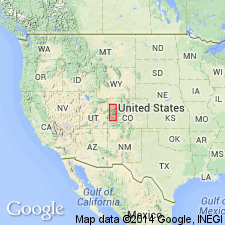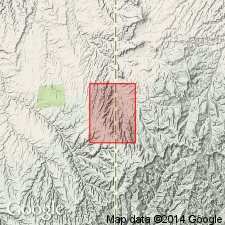
- Usage in publication:
-
- Cow Ridge Member*
- Modifications:
-
- Named
- Reference
- Dominant lithology:
-
- Shale
- Sandstone
- AAPG geologic province:
-
- Piceance basin
Summary:
Named as a member of Eocene Green River Formation for exposures on south side, Cow Ridge, Long Point quad, Garfield Co, CO, Piceance basin. Type section measured on Cow Ridge, sec 31, T7S, R98W. Reference section measured on Yellow Creek, secs 9 and 10, T2N, R98W. Section also measured on Fletcher Gulch, secs 3, 10, 11, 14, T1N, R100W. Is 63 m thick at type where it consists of brown ostracodal clay shale, carbonaceous shale, thin persistent sandstones, siltstones, and ostracodal limestones. Is 149 m thick at Yellow Creek. At Fletcher Gulch the member is 216 m thick and consists of low-grade, clay-rich oil shale (lower) and claystone, mudstone, and conglomeratic sandstone (upper). Overlies Wasatch Formation. Underlies Garden Gulch Member on Fletcher Gulch. Underlies tongue of Wasatch at other two localities. Contains ostracod, mollusks, turtles, fish, etc fossils. Deposited in early stage of Lake Uinta, a fresh-water, lacustrine unit. Age determined by palynomorphs as early to early middle Eocene. Formerly mapped by earlier workers as part of Douglas Creek Member of Green River, lacustrine unit of Wasatch, middle part of Shire Member of Wasatch, unnamed member of Green River, and the tongue at Cow Ridge of Douglas Creek Member. Areal limits map included.
Source: GNU records (USGS DDS-6; Denver GNULEX).

- Usage in publication:
-
- Cow Ridge Member*
- Modifications:
-
- Areal extent
- AAPG geologic province:
-
- Uinta basin
Summary:
Extended to eastern UT and Uinta basin and is lowest member of Eocene Green River Formation. Mapped in Davis Canyon quad, eastern Uintah Co, UT and western Garfield and Rio Blanco Cos, CO. Unit thins from about 100 ft in north part of quad to a few inches in the south.
Source: GNU records (USGS DDS-6; Denver GNULEX).
For more information, please contact Nancy Stamm, Geologic Names Committee Secretary.
Asterisk (*) indicates published by U.S. Geological Survey authors.
"No current usage" (†) implies that a name has been abandoned or has fallen into disuse. Former usage and, if known, replacement name given in parentheses ( ).
Slash (/) indicates name conflicts with nomenclatural guidelines (CSN, 1933; ACSN, 1961, 1970; NACSN, 1983, 2005, 2021). May be explained within brackets ([ ]).

